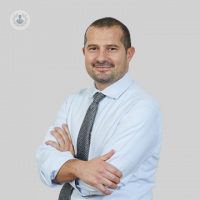Recurrent implantation failure: everything you need to know
Written by:Recurrent implantation failure (RIF) represents a daunting dilemma for individuals and couples pursuing assisted reproductive technology (ART) to achieve pregnancy. Leading consultant in obstetrics, gynaecology, and reproductive medicine Dr Simone Rofena delves into the potential causes, treatment options, and the psychological impact of RIF in ART.

What is recurrent implantation failure (RIF) in assisted reproductive technology (ART)?
Recurrent implantation failure (RIF) is typically defined as the occurrence of three or more failed implantation attempts in a patient who has undergone multiple IVF cycles.
It is important to note that the specific criteria for defining RIF can differ from one fertility clinic to another. This means that doctors must consider individual patient factors and specific circumstances in the clinic when diagnosing RIF.
What are some potential causes of recurrent implantation failure in ART?
There are several factors which can lead to RIF in patients undergoing fertility treatments such as IVF. These causes can be categorised into maternal, embryonic, and uterine factors. Maternal factors include advanced maternal age, hormonal imbalances, autoimmune disorders, and thrombophilia.
Embryonic factors contributing to RIF include chromosomal abnormalities and poor embryo quality, while uterine factors may include structural abnormalities, endometrial receptivity issues, and chronic endometritis. Patients must undergo a thorough evaluation in order to identify the underlying causes, which are specific to each patient.
What diagnostic tests and evaluations are available?
The investigation of RIF typically entails a comprehensive diagnostic workup. This may involve assessing hormonal profiles, immune system function, genetic factors, and endometrial receptivity.
Diagnostic tools used for RIF in ART may include hysteroscopy, karyotype analysis, thrombophilia testing, and endometrial receptivity assays. By identifying the underlying factors contributing to RIF, clinicians can tailor treatment strategies to address the patient's unique needs in an effective manner.
What are my treatment options and how successful are they?
The management of RIF varies based on the identified causes and individual patient characteristics.
Treatment modalities may include the following:
- lifestyle modifications
- hormonal therapy
- immunomodulatory agents
- surgical interventions
- customised IVF protocols
The success rates of such treatments can vary widely, and it is crucial to manage patient expectations realistically, although a personalised approach aimed at identifying and treating the underlying causes can significantly increase the chances of achieving a successful pregnancy. Ongoing research continues to refine treatment approaches, offering hope to individuals facing RIF.
What are the emotional and psychological effects of recurrent implantation failure (RIF)?
RIF exerts profound emotional and psychological impacts on individuals and couples. The repeated disappointments, financial burdens, and uncertainties can lead to anxiety, depression and stress.
Sadly, couples may experience strain in their relationships due to the emotional toll of RIF. It is essential for healthcare providers to recognise and address the psychosocial aspects of RIF, and to offer counselling and support services for couples undergoing this strain.
What support services and resources are available for this condition?
Fortunately, numerous support services and resources are available to help individuals and couples cope with the challenges of RIF. These include counselling and a patient-centred holistic approach, support groups, online communities, and educational materials.
Clinicians can play a vital role in connecting patients with these resources, and providing emotional support throughout their fertility journey.
If you would like to book a consultation with Dr Rofena, you can do so by visiting his Top Doctors profile today.


